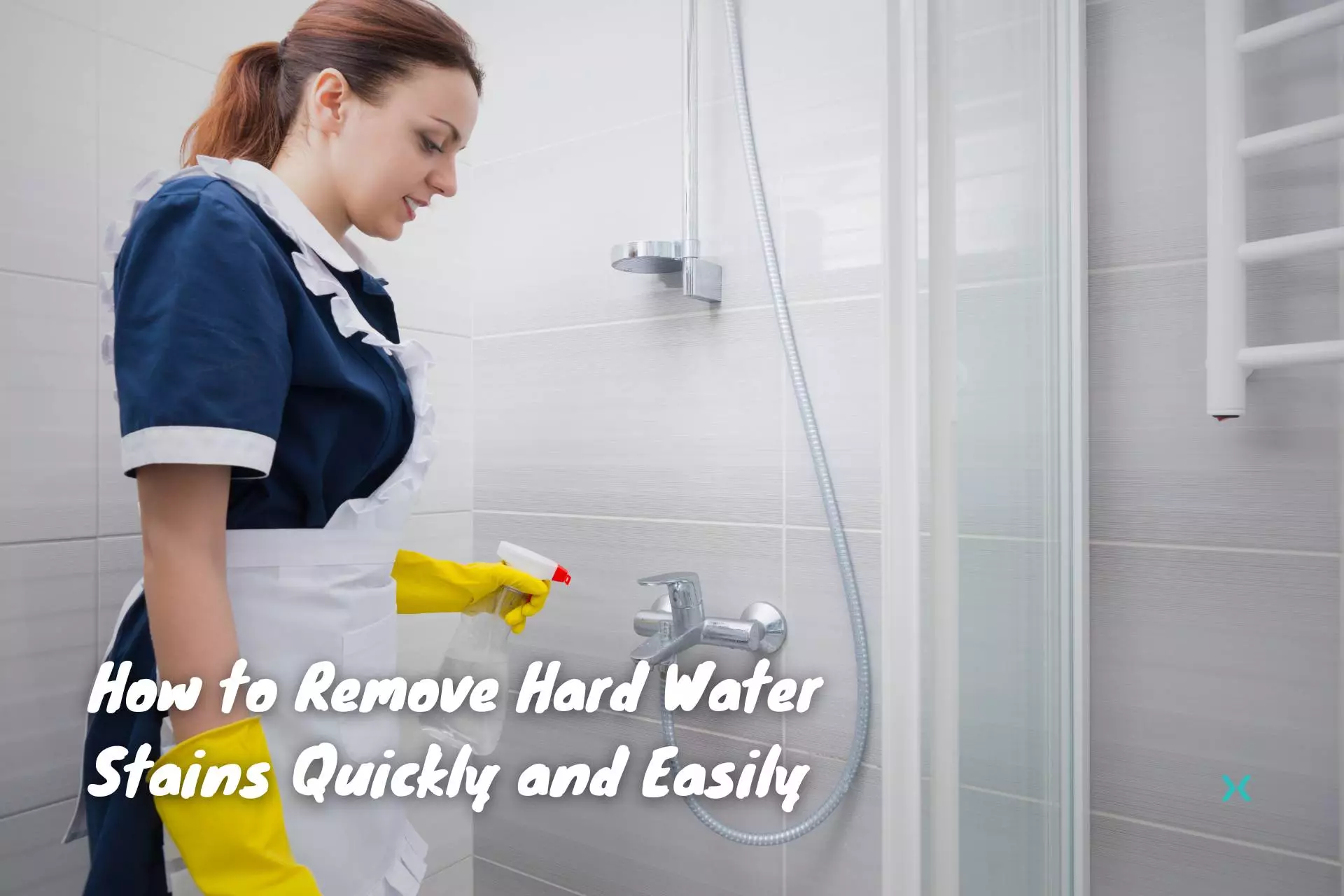How to Get Rid of Hard Water Stains
Table of Contents
Are you tired of those pesky white, chalky deposits on your fixtures and appliances? Hard water stains can be a real eyesore and a hassle to remove. But worry not! We have compiled a comprehensive guide on how to remove hard water stains quickly and easily. Get ready to say goodbye to those stubborn stains and hello to sparkling clean surfaces!
💧 Key Takeaways
- Identify the source and composition of hard water stains to choose the right cleaning agents and tools for effective removal.
- Maintain a routine cleaning schedule to prevent the formation of hard water stains.
- Utilize a combination of household items like vinegar and baking soda for an eco-friendly cleaning solution.
- Consider using commercial cleaners like CLR for persistent or severe stains.
- Seek professional cleaning services for stains that resist home remedies or cover extensive areas.
💧 Understanding Hard Water Stains
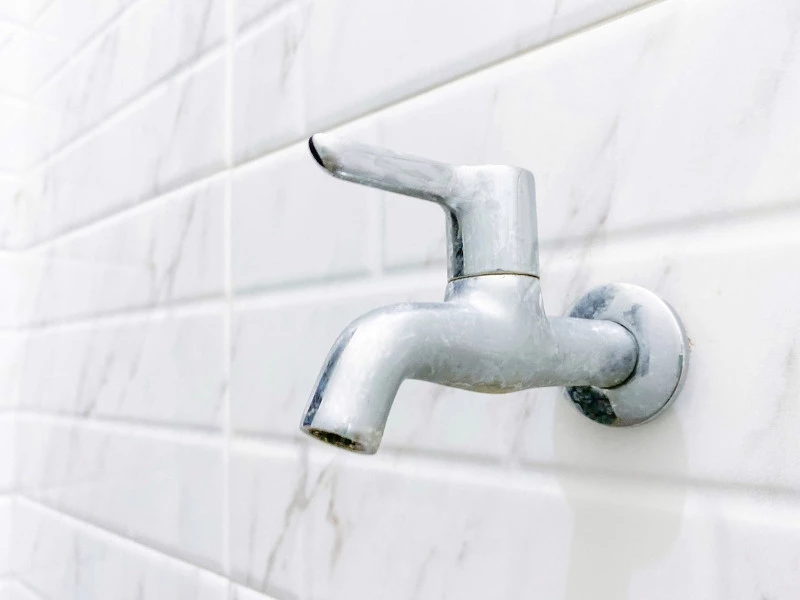
Hard water stains, also known as limescale or mineral deposits, are those persistent white, chalky deposits that accumulate on fixtures and appliances like shower doors with prolonged exposure to tough hard water buildup.
Elevated concentrations of minerals such as calcium and magnesium cause these annoying stains. If left unchecked, limescale buildup can impede the flow of water in pipes, eventually resulting in blockages and decreased efficacy of heating components.
Thankfully, there are several do-it-yourself hacks to tackle these hard water stains, some of which may require a bit of elbow grease. Once you comprehend the nature of hard water stains and the appropriate materials to use, their efficient removal and prevention of future recurrence become achievable.
💧 Essential Materials for Removing Hard Water Stains
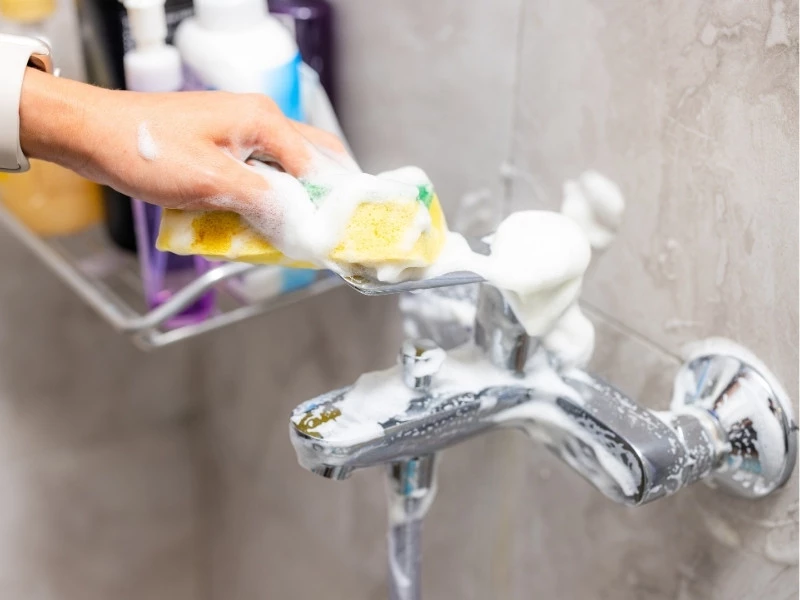
As you embark on the stain removal process, ensure you have all the vital materials needed to eliminate hard water stains from different surfaces. These materials include cleaning solutions, tools, and equipment that will help make the stain removal process a breeze. Subsequent sections will further elaborate on these materials and their effective utilization.
🧰 Cleaning Solutions
Baking soda and distilled white vinegar are two commonly used household supplies that can be employed to remove hard water stains. To create a cleaning paste, simply add baking soda to vinegar and apply it to the stained surface. These natural cleaners are known to remove stubborn hard water stains from various surfaces effectively.
In addition to homemade solutions, commercial cleaning agents such as Calcium, Lime, and Rust Remover (CLR) can also be used to tackle hard water stains and buildup. Nevertheless, adhering to the manufacturer’s instructions and exercising appropriate safety measures while using any cleaning solution to remove hard water mineral deposits is of utmost importance.
🧰 Tools and Equipment
The right tools and equipment can significantly affect the effectiveness of your hard water stain removal process.
Examples of tools and equipment for removing hard water stains include:
- Scrub brushes
- Sponges
- Microfiber cloths
- Drill brushes
- Grout scrubber drill attachments
- Stiff-bristle scrub brushes
These tools are particularly effective in removing hard water stains. Microfiber cloths demonstrate high efficacy for hard water stain removal due to their tiny fibers that can trap and lift dirt, minerals, and stains from surfaces.
Additionally, it’s important to utilize safety equipment such as:
- gloves
- safety goggles
- a mask or respirator
- protective clothing
when removing hard water stains to protect yourself from potential hazards.
💧 Removing Hard Water Stains from Glass Surfaces
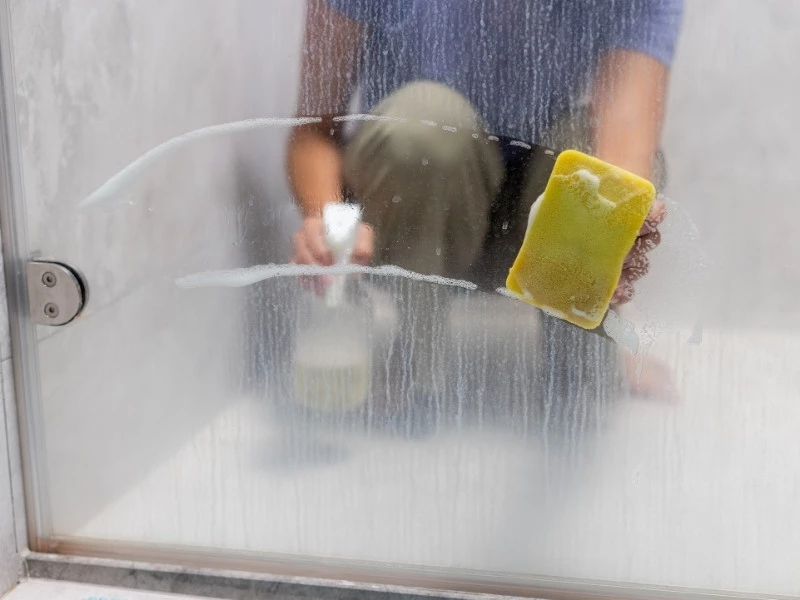
Having covered the necessary materials for removing hard water stains, we now turn our attention to one of the most common areas plagued by these obstinate stains: glass surfaces. Glass shower doors, windows, and other glass surfaces, including your glass shower door, can be plagued by unsightly hard water stains, but with the right cleaning solution and technique, you can restore their sparkle in no time.
🧰 Preparing the Cleaning Solution
A highly effective cleaning solution for removing hard water stains from glass surfaces is a mixture of one part distilled white vinegar or lemon juice and one part distilled water. Vinegar, especially cleaning vinegar, has a slightly higher acetic acid concentration than food-grade distilled white vinegar, making it an effective natural cleaner for dissolving and removing hard water stains.
Another option is to create a paste by mixing equal parts of vinegar and baking soda, which can then be applied to the stained glass surface. The vinegar and water solution and the baking soda and vinegar paste can effectively remove hard water stains from glass surfaces, so choose the best method for you.
🧰 Applying the Solution and Scrubbing
With your cleaning solution ready, you can now apply it to the stained glass surface and initiate the scrubbing process. If you’re using the vinegar and water solution, simply spray it onto the affected areas and let it sit for a few minutes before scrubbing the surface gently with a soft-bristled brush or microfiber cloth.
If you’re using the baking soda and vinegar paste, apply it to the stains, let it sit for a minimum of 30 minutes, and then scrub with a brush or cloth. After scrubbing, rinse the glass with clean water, employ a squeegee to remove the majority of the water, and finally, dry the surface completely with a lint-free microfiber cloth.
If the initial cleaning method fails to remove the hard water stains, consider trying a commercial hard water stain remover or seek professional help.
💧 Tackling Hard Water Stains in Bathrooms
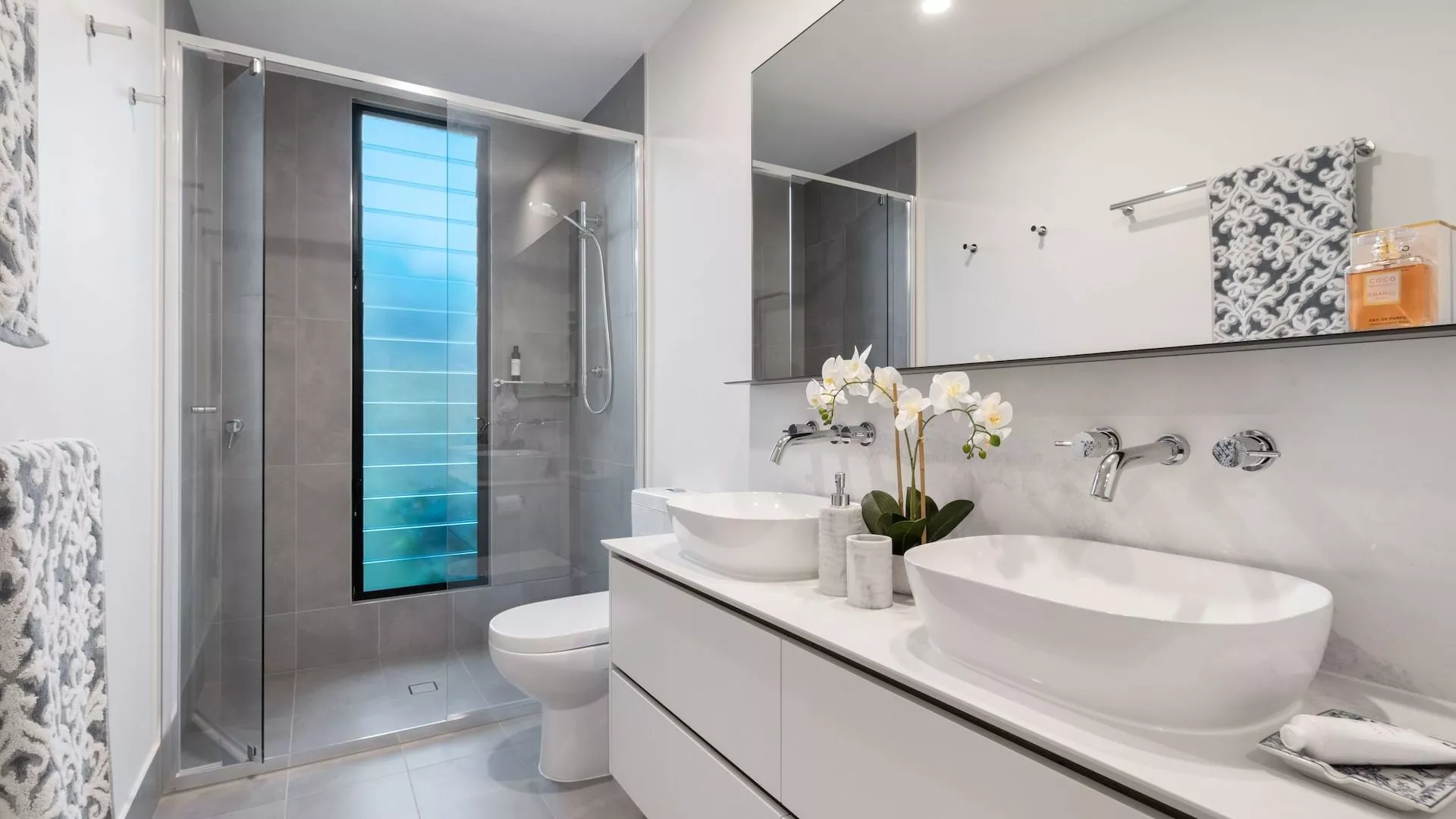
Bathrooms are another common area where hard water stains can wreak havoc. From showerheads and faucets to tiles and grout, these pesky stains can make your bathroom look less than pristine. This part’s gonna show you some cool tricks to tackle those pesky hard water stains in your bathroom.
🧰 Showerhead and Faucet Cleaning
Cleaning showerheads and faucets regularly can help prevent the buildup of hard water stains. A mixture of equal parts distilled white vinegar and water is an effective cleaning solution for eliminating hard water stains from these fixtures.
You can either immerse a toothbrush in white vinegar and scrub the water jets, followed by wiping them clean and turning on the jets to flush out the clogging minerals, or you can soak a cloth or paper towel in vinegar and apply it to the stains, allowing it to sit for a few minutes before wiping it off.
For stubborn, hard water stains, you may need to use a soft brush, such as a toothbrush or a brush with nylon bristles, to scrub the affected surfaces. Remember to rinse the showerhead and faucet thoroughly with cold water after cleaning to remove any remaining residue.
🧰 Tile and Grout Cleaning
Cleaning tile and grout to remove hard water stains involves the following steps:
- Apply a cleaning solution to the affected tiles and grout.
- Scrub the area with a brush or sponge.
- Create a mixture of equal parts vinegar and water in a spray bottle.
- Spray the vinegar and water solution onto the affected tiles.
- Let the solution sit for a few minutes.
- Sprinkle baking soda on top of the solution.
- Scrub the area with a brush or sponge.
- Rinse the tiles and grout with water.
- Repeat the process if necessary.
For more delicate surfaces such as granite, marble, or porcelain, a gentler cleaning solution such as isopropyl alcohol may be more appropriate. Always test any cleaning solution on a small, inconspicuous area before applying it to the entire surface to ensure it won’t cause any damage or discoloration.
💧 Eliminating Hard Water Stains from Toilets and Sinks
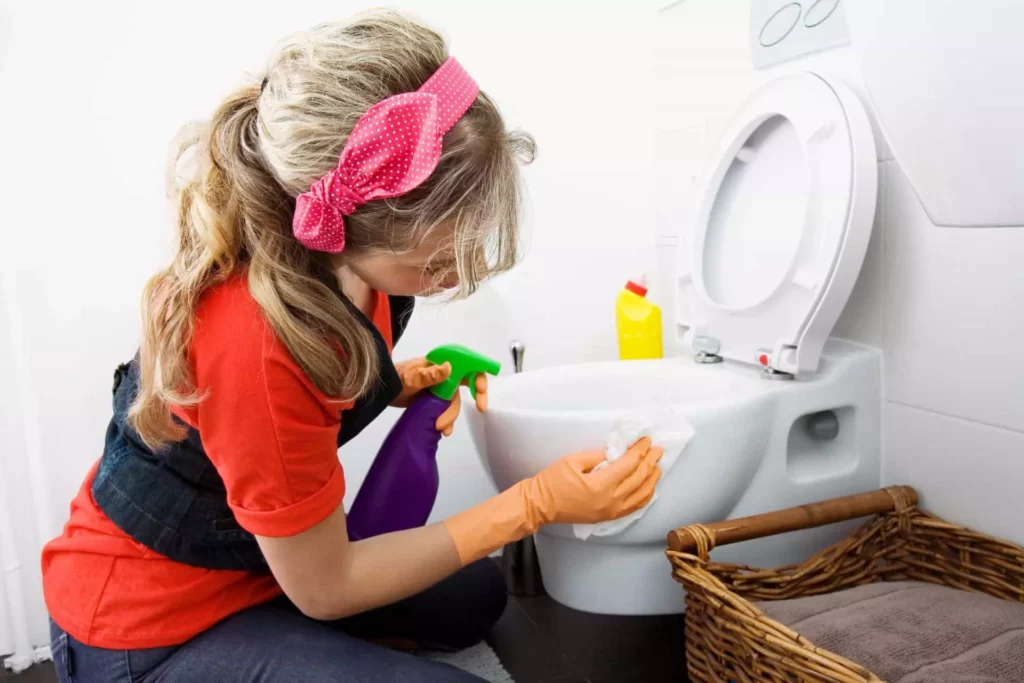
Toilets and sinks are also common areas where hard water stains can accumulate. This section will explore a variety of techniques for eliminating these persistent stains from toilet bowls, sink basins, and faucets, aiding in maintaining a spotless and sanitary bathroom environment.
🧰 Toilet Bowl Cleaning Techniques
Cleaning your toilet bowl regularly can help prevent the buildup of hard water stains. A pumice stone or a cleaning solution such as hydrogen peroxide can be effective in removing these stains from the toilet bowl surface.
Alternatively, you can use a mixture of one part CLR and eight parts water to clean the toilet bowl and let it sit for 10-15 minutes before rinsing it thoroughly with cold water. For particularly stubborn hard water stains, you may need to use a toilet brush or another scrub brush to remove the buildup effectively.
Consistent cleaning and scrubbing can help keep your toilet bowl free of unsightly hard water stains.
🧰 Sink Basin and Faucet Cleaning Tips
Removing hard water stains from sink basins and faucets can be achieved using a cleaning solution and scrubbing with a brush or sponge. For stainless steel sink basins, a mixture of white vinegar and water or a paste made from baking soda and water can effectively remove hard water stains.
White vinegar is a suitable cleaning solution for porcelain sink basins to dissolve the mineral deposits. When scrubbing sink basins and faucets, be sure to use a non-abrasive brush or sponge to avoid scratching the surface. Rinse the area thoroughly with clean water after scrubbing to remove any remaining residue, and your sink basin and faucet will be free of hard water stains.
💧 Preventing Hard Water Stains
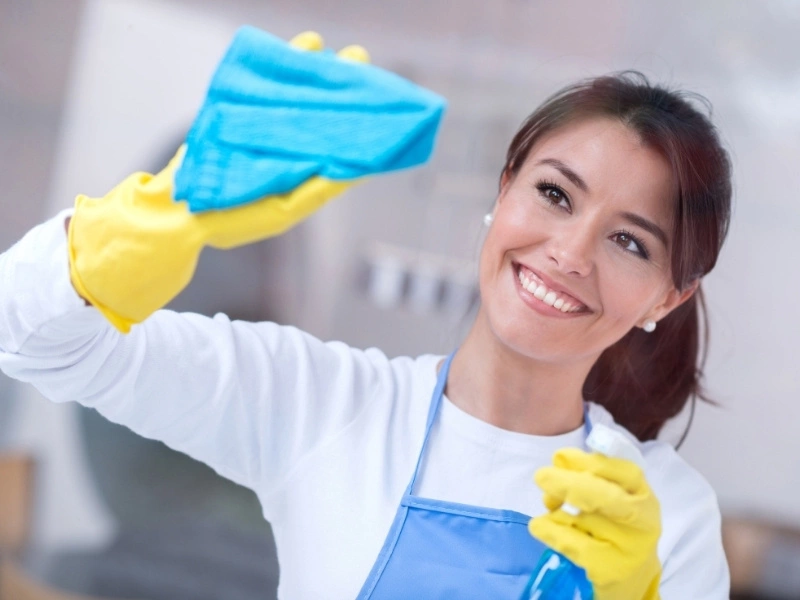
Although the removal of hard water stains can prove challenging, focusing on prevention is equally important. By taking proactive measures, you can keep your surfaces looking clean and free of those unsightly stains.
This section will delve into regular cleaning habits and water-softening solutions that can aid in preventing the formation of hard water stains in the first place.
🧰 Regular Cleaning Habits
Establishing regular cleaning habits is essential in preventing hard water stains from forming on your surfaces. Experts recommend spending 1-2 minutes per day wiping down fixtures and surfaces exposed to hard water to minimize the buildup of mineral deposits.
Using a lint-free microfiber cloth, such as the Maker’s Clean Waffle Weave Cloth, is a great option for drying wet surfaces and preventing hard water stains from forming.
Consistently cleaning showerheads and faucets at least once a month, or even weekly, can help prevent hard water stains and keep your fixtures looking clean. Regular cleaning not only helps prevent hard water stains but also ensures a more hygienic and pleasant environment in your home.
🧰 Water Softening Solutions
In addition to regular cleaning habits, utilizing water-softening solutions can help prevent hard water stains from forming. Water softeners work by filtering out minerals from the water, maintaining the cleanliness of clothes, and enhancing the lather of personal care products.
There are various types of water softeners available in the market, including:
- Salt-based water softeners
- Salt-free water softeners
- Dual-tank water softeners
- Magnetic water softeners
Installing a whole-home water softener can be an effective solution for preventing hard water stains throughout your home. If you’re unsure about which water softener is right for you, consult a plumber or water treatment specialist for guidance and recommendations.
💧 When to Seek Professional Help
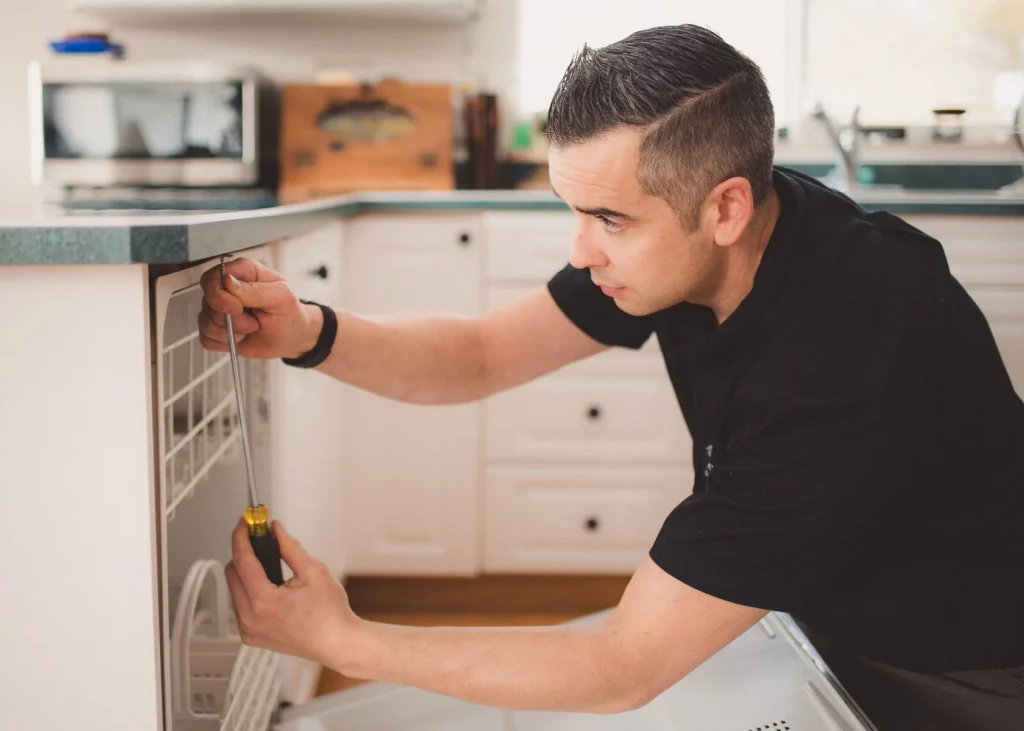
Despite your best efforts, hard water stains may persist or be too difficult to remove independently. Recognizing when to seek professional assistance for hard water stain removal is fundamental.
If the stains are particularly resistant, have been present for an extended period of time, or have not been successful with more conventional cleaning methods, it may be time to enlist the services of a professional.
Professional hard water stain removal services can provide specialized cleaning methods, including strong acidic mixtures and specialized products to dissolve residue and tough stains caused by hard water. They possess extensive knowledge, training, and access to modern equipment to handle even the most difficult glass stain removal jobs.
Don’t hesitate to seek professional help to ensure the best possible results.
💧 Summary
In conclusion, managing hard water stains requires understanding their nature and adopting effective cleaning and prevention strategies. You can keep your surfaces pristine by using the right tools and cleaning solutions and maintaining regular cleaning routines. Prevention is crucial for a spotless environment, and professional help is available when needed.
Phyxter Home Services brings expertise and a commitment to quality in tackling plumbing challenges, including hard water stain removal. Our articles offer a wealth of knowledge drawn from extensive experience. For more insights into plumbing solutions, explore our other articles. If you need professional assistance, consider Phyxter Home Services. Let us help you maintain a clean and healthy home.
💧 Frequently Asked Questions
How do you remove calcified hard water stains?
Remove calcified hard water stains by mixing equal parts of baking soda and water, applying it to the sink basin, and then spraying a solution of vinegar and water on the paste.
Leave it for 10 minutes, then rinse away the solution and wipe clean.
Can hard water stains be removed?
Hard water stains can be removed using common household supplies like vinegar and baking soda.
To remove these stains, squirt vinegar onto the surface with a spray bottle, allowing it to sit for up to 15 minutes.
This method is effective for surfaces with frequent water contact, such as sinks, toilets, showers, and bathtubs.
What is the best cleaner for stubborn hard water stains?
A paste made from equal parts vinegar and baking soda is an effective solution for tough and stubborn hard water stains.
Alternatively, cleaning agents such as Calcium Lime Rust Remover (CLR), cleaning vinegar, or hydrogen peroxide can be used, each requiring varying levels of scrubbing.
Do Dawn and vinegar remove hard water stains?
Yes, a mixture of equal parts water and vinegar (with an optional teaspoon of Dawn dish soap) can remove hard water stains.
Simply spray it on the stained area and let it sit for at least 15 minutes before wiping it clean.
What causes hard water stains?
Hard water stains are caused by elevated levels of minerals like calcium and magnesium present in the water.

